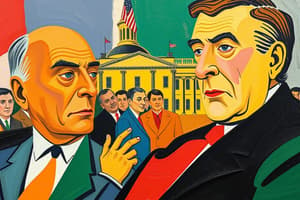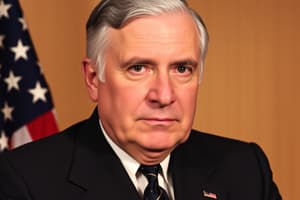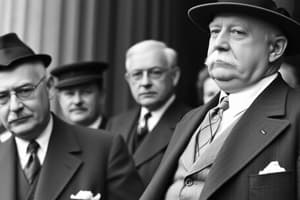Podcast
Questions and Answers
All of the following characterize Warren G. Harding's weaknesses as president EXCEPT
All of the following characterize Warren G. Harding's weaknesses as president EXCEPT
- Corruption in his administration
- Lack of public support
- A lack of political experience (correct)
- Poor decision-making skills
Which of the following best describes the Republican economic policies implemented under President Warren G. Harding?
Which of the following best describes the Republican economic policies implemented under President Warren G. Harding?
- An increase in government regulations
- A modification in laissez-faire economic doctrine that included using the courts and administrative agencies to maximize the profits of the business sector (correct)
- A shift towards socialist policies
- A focus on agricultural reform
Which of the following best characterizes US Supreme Court decisions in the 1920s?
Which of the following best characterizes US Supreme Court decisions in the 1920s?
- Neutral in social issues
- Supportive of labor rights
- Extremely hostile to progressive social reform legislation enacted during the progressive era (correct)
- Promoting civil rights advancements
What was the primary motivation for President Harding's willingness to seize the initiative on the issue of international disarmament?
What was the primary motivation for President Harding's willingness to seize the initiative on the issue of international disarmament?
All of the following were long-term effects of the Fordney-McCumber and Hawley-Smoot Tariff Laws EXCEPT that the tariffs
All of the following were long-term effects of the Fordney-McCumber and Hawley-Smoot Tariff Laws EXCEPT that the tariffs
The Teapot Dome and other government scandals during the Harding administration prompted all of the following EXCEPT
The Teapot Dome and other government scandals during the Harding administration prompted all of the following EXCEPT
How did the McNary-Haugen bill, passed by Congress and vetoed by President Coolidge, seek to assist American farmers?
How did the McNary-Haugen bill, passed by Congress and vetoed by President Coolidge, seek to assist American farmers?
Senator Robert LaFollette's Progressive party advocated all of the following EXCEPT
Senator Robert LaFollette's Progressive party advocated all of the following EXCEPT
Which of the following arguments was advanced by America's European allies to try to persuade the US that they should not have to repay loans issued by America to them during WWI?
Which of the following arguments was advanced by America's European allies to try to persuade the US that they should not have to repay loans issued by America to them during WWI?
What did the Dawes Plan of 1924 depend on to successfully address the problem of war debt and war reparations?
What did the Dawes Plan of 1924 depend on to successfully address the problem of war debt and war reparations?
All of the following were political liabilities for New York Democratic governor Al Smith in his unsuccessful, path-breaking run for the presidency in 1928 EXCEPT Smith's
All of the following were political liabilities for New York Democratic governor Al Smith in his unsuccessful, path-breaking run for the presidency in 1928 EXCEPT Smith's
Which of the following was NOT a cause of the Great Depression?
Which of the following was NOT a cause of the Great Depression?
Which of the following best describes President Hoover's approach to the Great Depression?
Which of the following best describes President Hoover's approach to the Great Depression?
Which of the following most limited the ability of the League of Nations to reverse Japan's invasion and occupation of Manchuria?
Which of the following most limited the ability of the League of Nations to reverse Japan's invasion and occupation of Manchuria?
Which 1920s president is most closely related to President Grover Cleveland's 1887 idea, 'Though the people support the government, the government should not support the people'?
Which 1920s president is most closely related to President Grover Cleveland's 1887 idea, 'Though the people support the government, the government should not support the people'?
America abandoned its policy of isolationism in the 1920s in all of the following ways EXCEPT by
America abandoned its policy of isolationism in the 1920s in all of the following ways EXCEPT by
Study Notes
Warren G. Harding's Presidency
- Harding lacked political experience, which was a significant weakness.
- Implemented modifications to laissez-faire economic policies, utilizing courts to boost business profits.
- Under Harding, Supreme Court decisions were largely hostile to progressive reforms.
International Relations and Economic Policies
- Harding's push for international disarmament stemmed from business interests reluctant to fund a larger Navy.
- The Fordney-McCumber and Hawley-Smoot Tariffs did not effectively close trade gaps or promote peace abroad.
Scandals and Political Challenges
- The Teapot Dome scandal revealed a lack of leadership from Harding in addressing corruption and reform.
- Al Smith, the Democratic governor of New York, faced political liabilities but was noted for his strong radio speaking skills.
Economic Assistance and Agricultural Policies
- The McNary-Haugen bill aimed to support farmers by having the government purchase surplus crops for foreign sale.
- The Great Depression's causes did not include excessive government spending on job creation.
Herbert Hoover and the Depression
- Hoover's approach involved limited federal assistance, focusing aid on businesses and local governments rather than individuals.
- The inability of the League of Nations to intervene in Manchuria was largely due to the absence of the U.S. as a member.
U.S. Foreign Policy in the 1920s
- The U.S. moved away from isolationism but did not do so through the Nine Power Treaty, which affirmed the Open Door Policy in China.
- Hoover's philosophy aligned with Grover Cleveland’s view that government should not directly support individuals.
Studying That Suits You
Use AI to generate personalized quizzes and flashcards to suit your learning preferences.
Description
Test your knowledge on chapter 32 of the AP History curriculum, focusing on Warren G. Harding's presidency and the Republican economic policies of the time. This quiz includes key concepts and definitions to help you prepare for your exams effectively.




